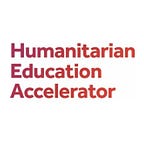Delivering English Language Training (ELT) at Distance: A Teacher’s Perspective
by Mosaik Education
As part of the HEA, Mosaik has been developing and testing the Open Dogme Toolkit (ODT). The Toolkit aims to support English language teachers of refugee youth to maintain the interactive and human side of ELT during Covid-19.
Since the design sprint, we have facilitated online training for two cohorts of teachers. The training consists of six facilitated 1-hour sessions delivered via Zoom, plus one Moodle platform induction session and four hours of self study. Following the live training, trainees also receive support through a community of practice, where they share ideas and challenges, and receive support from experienced teachers.
In this blog post, we will share reflections from an interview with Abeer, a teacher in Mafraq Jordan, who was part of our initial ODT cohort. Abeer teaches beginner and intermediate English to 13–17 year olds.
- Engaging and applicable course content
“My class is more communicative, more fun and not as hard as before. I used to hate using Zoom and online teaching. I’m not going to say love it now. But there is a huge difference and now I can give my classes in a fun and communicative way.” — Abeer
The main piece of feedback from Abeer is that the course content is applicable and adaptable to situations that are actually found in the classroom. As well as discussing pedagogical theory, teachers are using our office hours and the community of practice to discuss difficulties they have encountered in the online classroom setting and how they overcome them.
The ‘communicative activities’ session enabled teacher’s to be more comfortable facilitating classroom teaching via Zoom than they did before taking part in the course. Abeer learnt how to better utilise features such as breakout rooms on Zoom to encourage class discussion (the teacher can move in and out of each group like in a physical classroom setting).
As a result of attending the ODT training, Abeer has implemented the following into her teaching:
● Letting students find their own mistakes. For example, giving students sentences with grammatical errors in and asking them to correct the mistakes
● Giving students some questions to answer before the class so that in class they can have a debate based on these questions
● Playing language-based drawing games over Zoom using the webcam function. Abeer likes to use these to help students learn prepositions
2. Learning how to improve delivery
The survey and interview feedback we have received from teachers tells us that the content in the training has helped enhance existing teaching, increase classroom engagement and encourage teacher-teacher support. However, a major area of focus in improving our Dogme Toolkit is in delivery: In the first cohort we had 22 teacher’s enrolled, but on average only 12 attended all sessions. We know the content and methods in the Toolkit are useful, but how do we ensure it is accessible for teachers to learn and apply the method? We are exploring several options for adapting delivery: alternative timing to make sure that it fits around working schedules (as some teachers have two jobs); intensive and spaced delivery options and asynchronous delivery and follow up options.
3. Moving forward with implementation
There were three lessons for the Mosaik team during the HEA. Firstly, to go further in adapting to context and working according to the teacher’s circumstances. The second key lesson is to not be unnerved by the uncertainty and multiple challenges, but to accept the challenges that arise and regularly prioritise changes that can be made in response to the uncertainty. Finally, when working with complex behavioural and social changes — like education approaches and systems — patience is required. Mosaik has had to adjust its training course and MEL system several times throughout implementation, which can become frustrating.
Mosaik has three priorities for the Open Dogme Toolkit during 2021: to collect more robust evidence over a longer time period; to seek funding to further develop and refine Toolkit components; and to develop and test the scaling framework and business model developed under the HEA. We will be working on these priorities as we head into the third cohort of dogme training later this month.
About Mosaik
Mosaik (www.mosaik.ngo) is a non-profit organisation that supports refugees to reach university,through programmes that focus on academic guidance and English language training in Jordan, Lebanon and Turkey. All of our programmes are co-designed with refugees, leverage technology and are open for local community organisations to lead. In 2020 we reached over 300 young people, despite the Covid-19 pandemic.
